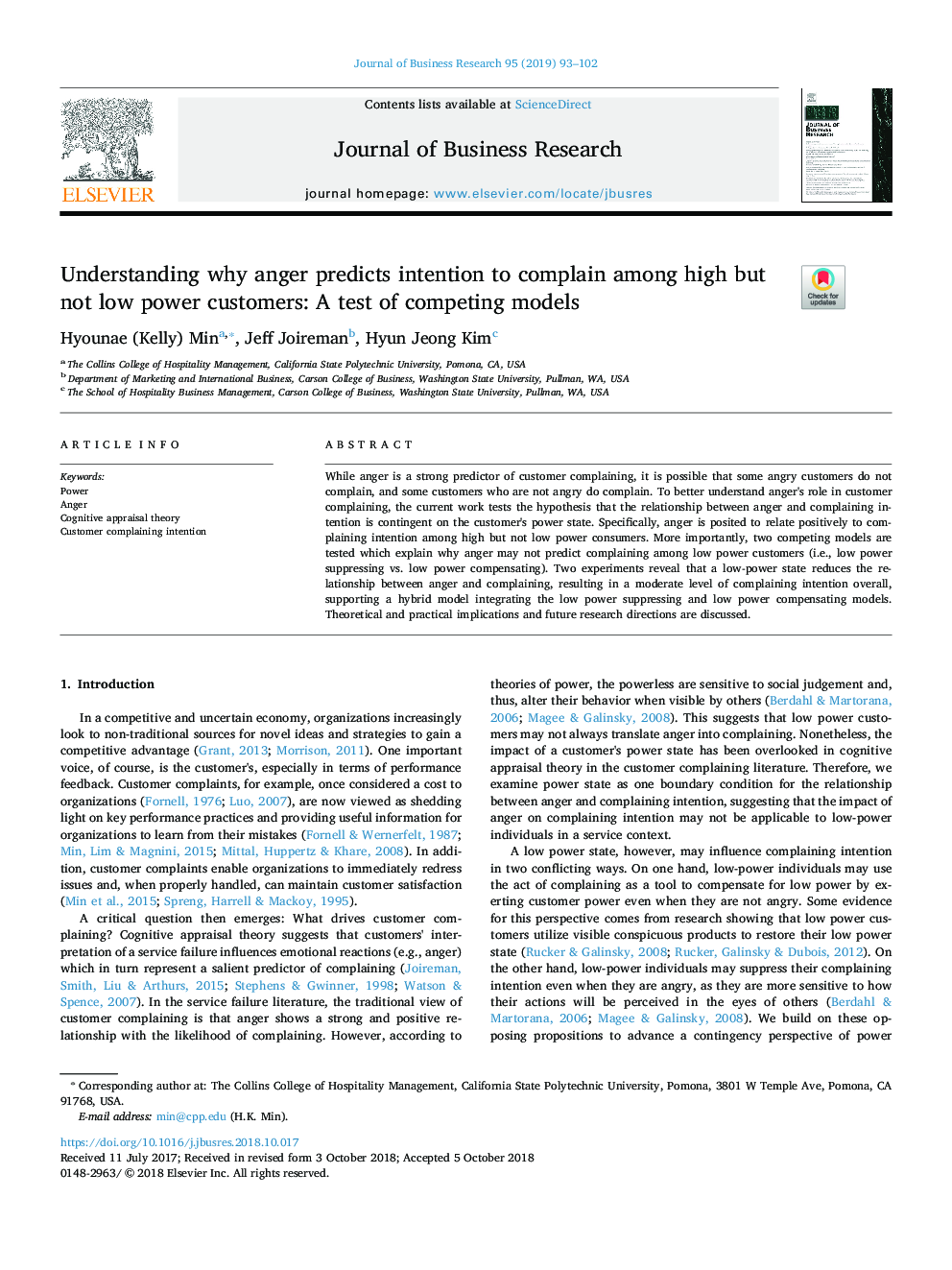| کد مقاله | کد نشریه | سال انتشار | مقاله انگلیسی | نسخه تمام متن |
|---|---|---|---|---|
| 11009872 | 1820002 | 2019 | 10 صفحه PDF | دانلود رایگان |
عنوان انگلیسی مقاله ISI
Understanding why anger predicts intention to complain among high but not low power customers: A test of competing models
ترجمه فارسی عنوان
درک اینکه چرا خشم پیش بینی قصد شکایت را در میان مشتریان با قدرت بالا اما نه کم قدرت: تست مدل های رقابت
دانلود مقاله + سفارش ترجمه
دانلود مقاله ISI انگلیسی
رایگان برای ایرانیان
کلمات کلیدی
قدرت، خشم، نظریه ارزیابی شناختی، قصد شکایت مشتری،
ترجمه چکیده
در حالی که خشم پیش بینی قوی از شکایت مشتری است، ممکن است برخی از مشتریان عصبانی شکایت نکنند و برخی از مشتریانی که عصبانی نیستند شکایت دارند. برای درک بهتر نقش خشم در شکایت مشتری، کار فعلی فرضیه را بررسی می کند که ارتباط بین خشم و قصد شکایت به وضعیت قدرت مشتری بستگی دارد. به طور خاص، خشم به طور مثبت در ارتباط با قصد شکایت در میان مصرف کنندگان بالا، اما نه قدرت کم قرار دارد. مهمتر از همه، دو مدل رقابتی مورد آزمایش قرار می گیرند که توضیح می دهند که چرا خشم ممکن است شکایات را در میان مشتریان کم قدرت پیش بینی کند (به عنوان مثال، سرکوب کم قدرت و کم کردن قدرت کم). دو آزمایش نشان می دهد که یک دولت کم قدرت، ارتباط بین خشم و شکایت را کاهش می دهد، و در نتیجه سطح مطلوب قصد شکایت را به طور کلی حفظ می کند، از یک مدل ترکیبی که یکپارچه سازی مدل های کم قدرت تخفیف و کم قدرت را پشتیبانی می کند. مفاهیم نظری و عملی و رویه های پژوهشی آینده مورد بحث قرار گرفته است.
موضوعات مرتبط
علوم انسانی و اجتماعی
مدیریت، کسب و کار و حسابداری
کسب و کار و مدیریت بین المللی
چکیده انگلیسی
While anger is a strong predictor of customer complaining, it is possible that some angry customers do not complain, and some customers who are not angry do complain. To better understand anger's role in customer complaining, the current work tests the hypothesis that the relationship between anger and complaining intention is contingent on the customer's power state. Specifically, anger is posited to relate positively to complaining intention among high but not low power consumers. More importantly, two competing models are tested which explain why anger may not predict complaining among low power customers (i.e., low power suppressing vs. low power compensating). Two experiments reveal that a low-power state reduces the relationship between anger and complaining, resulting in a moderate level of complaining intention overall, supporting a hybrid model integrating the low power suppressing and low power compensating models. Theoretical and practical implications and future research directions are discussed.
ناشر
Database: Elsevier - ScienceDirect (ساینس دایرکت)
Journal: Journal of Business Research - Volume 95, February 2019, Pages 93-102
Journal: Journal of Business Research - Volume 95, February 2019, Pages 93-102
نویسندگان
Hyounae (Kelly) Min, Jeff Joireman, Hyun Jeong Kim,
